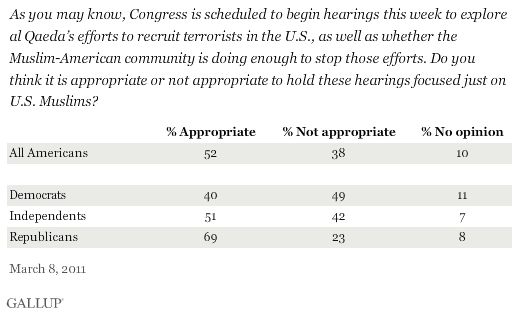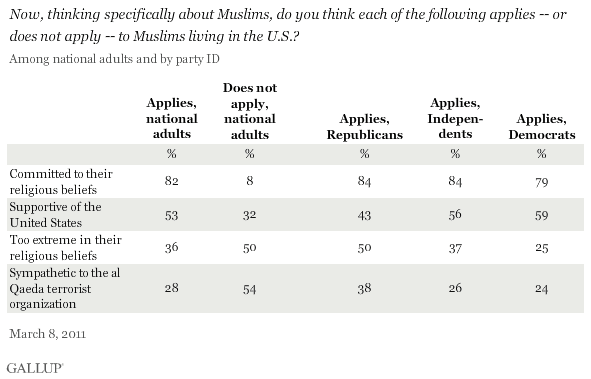PRINCETON, NJ -- Republicans and Democrats differ significantly in their views of the House Homeland Security Committee hearings to investigate terrorist recruitment efforts in the American Muslim community, scheduled to begin Thursday morning in Washington. While 52% of all Americans say these hearings are appropriate, Republicans, at 69%, are much more likely to say this than are Democrats, at 40%. Independents' views are similar to the national average, with 51% supporting the hearings.

Republican Rep. Peter King of New York will chair the scheduled hearings, which are officially called "The Extent of Radicalization in the American Muslim Community and That Community's Response." The hearings have become controversial, with various individuals and groups arguing that they should be expanded to other groups involved in domestic terrorism rather than singling out just U.S. Muslims. The March 8 USA Today/Gallup poll underscores the polarizing nature of the hearings, with King's fellow Republicans strongly supporting them, while Democrats tilt in the opposite direction.
The survey also included a set of questions asking Americans whether four specific characteristics apply to Muslims living in the U.S. These characteristics are similar to a longer series measured in a USA Today/Gallup poll conducted in July 2006.
As was the case in 2006, Americans overwhelmingly agree that Muslims in America are committed to their religious beliefs and about half (53%) also agree that Muslims are supportive of the United States. Thirty-six percent say Muslims living in the U.S. are too extreme in their religious beliefs. Americans are least likely to agree that U.S. Muslims are sympathetic to the al Qaeda terrorist organization (28%), similar to what Gallup found in 2006.

There are significant partisan differences in these views:
- Forty-three percent of Republicans say Muslims are "supportive of the United States," while a majority of independents and Democrats agree.
- Half of Republicans say Muslims are too extreme in their religious beliefs, while well less than half of independents (37%) and Democrats (25%) agree.
A minority of all groups -- regardless of party orientation -- say Muslims in America are sympathetic to the al Qaeda terrorist organization, although Republicans are somewhat more likely to believe this.
Implications
The controversy over the King hearings in the House Homeland Security Committee has arisen in large part because some individuals and groups feel that Muslim Americans are unduly targeted in a way that may be harmful to the image of Muslims in this country. Rep. King has said Muslims shouldn't be threatened or intimidated by his hearings, and that "it makes no sense to talk about other types of extremism, when the main threat to the United States today is talking about al Qaeda."
The current data suggest that Americans overall are more likely than not to agree with King that his hearings are appropriate, at least in their reactions to the description of those hearings included in this survey. The majority of Americans, however, do not believe that Muslims in this country are sympathetic to al Qaeda.
The large partisan gulf in some of these attitudes, however, underscores the sharply polarized way in which Republicans and Democrats view the world today -- even in their subjective characterizations of religious groups. Less than half of Republicans believe that Muslims in the U.S. are supportive of the United States, while a clear majority of Democrats do. And, most relevant to the current debate, while Republicans strongly support the appropriateness of the King hearings, less than half of Democrats agree.
Survey Methods
Results for this USA Today/Gallup poll are based on telephone interviews conducted March 8, 2011, on the Gallup Daily tracking survey, with a random sample of 1,006 adults, aged 18 and older, living in all 50 U.S. states and the District of Columbia, selected using random-digit-dial sampling.
For results based on the total sample of national adults, one can say with 95% confidence that the maximum margin of sampling error is ±4 percentage points.
Interviews are conducted with respondents on landline telephones (for respondents with a landline telephone) and cellular phones (for respondents who are cell phone-only). Each sample includes a minimum quota of 150 cell phone-only respondents and 850 landline respondents, with additional minimum quotas among landline respondents for gender within region. Landline respondents are chosen at random within each household on the basis of which member had the most recent birthday.
Samples are weighted by gender, age, race, education, region, and phone lines. Demographic weighting targets are based on the March 2010 Current Population Survey figures for the aged 18 and older non-institutionalized population living in continental U.S. telephone households. All reported margins of sampling error include the computed design effects for weighting and sample design.
In addition to sampling error, question wording and practical difficulties in conducting surveys can introduce error or bias into the findings of public opinion polls.
Polls conducted entirely in one day, such as this one, are subject to additional error or bias not found in polls conducted over several days.
View methodology, full question results, and trend data.
For more details on Gallup's polling methodology, visit www.gallup.com.
